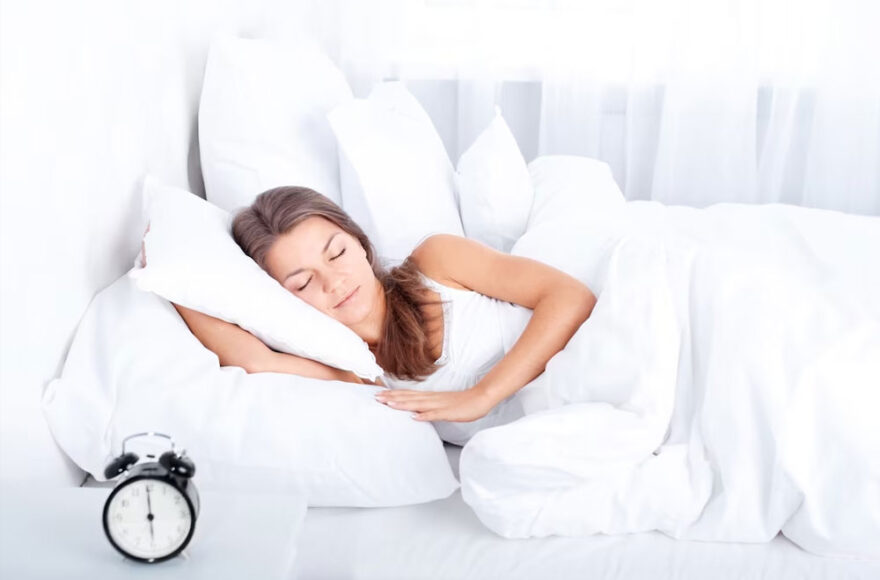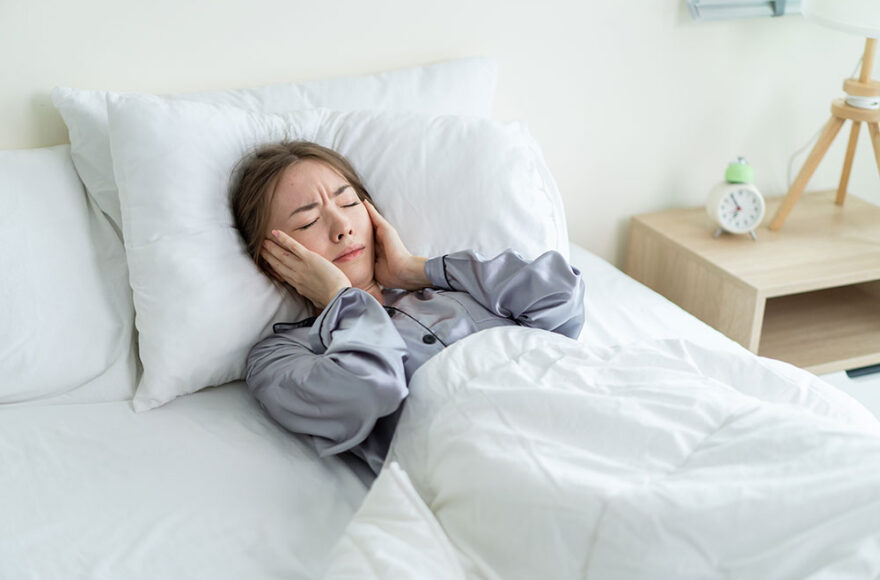8 Basic Things You Need to Know About Sleep Talking

Table of Contents
- Overview
- How is sleep talking common?
- What are the symptoms of sleep talking?
- Who talks in their sleep?
- What causes sleep talking?
- Should you seek treatment for sleep talking?
- How can you stop talking in your sleep?
- Make sure you get enough sleep, and so does your partner.
- Manage your stress and leave your stress outside the room.
- Limit your caffeine and alcohol intake.
- Maintain your sleep journal.
- When can sleep talking become problematic?
- When to see a doctor about sleep talking?
Overview
Sleep talking is a common phenomenon that can occur randomly and is believed to be parasomnia. A category that includes other sleep-related disorders like sleepwalking, night terrors, teeth grinding, and sleep sex. When someone experiences sleep talking, they may produce noises like groans, grunts, whispers, or laughs, or even speak in clear sentences without realizing it the next day. This condition is more frequently observed in children aged 3-10 but can also affect adults for various reasons.
Experts have identified stress as a leading cause of sleep talking. When the brain is overworked due to stress, it may not effectively switch between different sleep stages. It makes individuals more likely to act out their dreams and talk in their sleep. Interestingly, the most common words spoken during sleep talking are “no” and “yes.” However, the diagnosis of sleep talking usually only occurs when a partner or parent reports the incident, as the individual is often unaware that it’s happening.
Although there is no cure or proper treatment for sleep talking, sleep experts can help by providing guidance on adopting good sleep hygiene and lifestyle changes. Sleep talking is generally harmless and does not cause any problems. Unless the individual becomes violent or experiences frequent episodes, which could be a sign of a mental or sleep disorder that requires medical attention.
How is sleep talking common?
Sleep talking is much more common in children and adults. But we forget and don’t remember it and reported by a parent, sibling, or bed partner. One study suggests that about 66% of people have talked in their sleep at one time or another. And 17% have done so during the past three months.
Sleep talking is even more prevalent in children, and about 50% of kids aged 3-10 having a bout of somniloquy in the past year. But in adults, it is more common in people with psychiatric disorders or post-traumatic stress disorder. And frequent in people with certain types of dementia or those who experience a seizure during sleep.
What are the symptoms of sleep talking?
An observer only sees sleep talking symptoms because they are shown when you are unconscious. These vocalizations range from gibberish and mumbling to very complex and relatively clear sentences. The following sounds are considered sleep talking:
- Variation of sounds from mumbling to clear sentences
- Laughing
- Shouting
- Whistling
- Groaning
A 2017 study suggests that most (59%) of sleep talking is non-verbal, including mumbling, laughing, and shouting. No, and Yes are the top on the list. And up to 9.7% of instances contained swearwords.
Who talks in their sleep?
Everyone nearly experiences sleep talking, which occurs in all sleep cycle stages.
- Stages 1 and 2: In this stage, the person may talk clear words and sentences which are easy to understand.
- Stages 3 and 4: This is the deep sleep stage, and the speech might sound like moaning and hard to understand.
But children do more than adults; as we mentioned above, 50% of kids aged 3-10 talk in their sleep. Surprisingly, men may sleep talk more than women.
What causes sleep talking?
There are several causes of sleep talking. Here we share the possible causes of sleep talking:
1. REM Sleep Behavior Disorder
REM(rapid eye movement) is a sleep stage where we see dreams. It makes up about 20 to 25% of the total time when you are asleep. Your body is at rest during REM, but it’s a busy time for your brain.
In REM, you start dreaming; your eyes flutter rapidly underneath the eyelids, causing a rise in blood pressure, and it increases your heart rate. But your body is nearly paralyzed during REM, preventing you from acting out your dreams. While people with REM Sleep Behavior Disorder(RBD) act out their dreams. They not only talk but also can get violent or get out of bed to move around(sleepwalking).
2. Sleep Terrors
Sleep terror is common in children, but it occurs in adults too. One of the reasons it’s believed that children get more deep sleep than adults. As we mature, so do our brains, and we get less deep sleep.
During a night terror, the person can scream, yell, kick, thrash, and seem awake. They are frightened about some vision they saw in their dream or a hallucination. The next morning The person with night terror cannot recall what happened last night.
3. Nocturnal Sleep-related Eating Disorder
This phenomenon is associated with eating when you are asleep. The person with NS-RED, or Nocturnal Sleep-Related Eating Disorder, goes into the kitchen, prepares the entire meal, and eats while completely unconscious. They also talk to the person who asks them what they are doing in the kitchen at this time.
4. Mental Health Conditions
Sleep talking is frequently seen in people with mental health issues or conditions such as post-traumatic stress disorder (PTSD), depression, and anxiety. But scientists cannot conclude that if the mental health problem results in a sleep disorder or a sleeping disorder may lead to mental health conditions.
5. Medication:
Some medications can also cause sleep talking (somniloquy), such as antidepressants. They can increase the muscle tone in REM which makes you talk in sleep.
6. Emotional Stress
Stress will not only make it hard to fall asleep but also make you talk in sleep. The trouble thoughts can make your brain continuously work and prevent it from shutting down at night. Also, these thoughts are stored in the subconscious mind, so they come out when you are in a deep sleep.
7. Fever:
A high fever can also make you talk in sleep. Because your body and brain are exhausted and divert energy and resources to boost your immune system. Rather than regulate your body doing in the resting period.
8. Sleep Deprivation
Lack of sleep can make you talk in sleep. Scientists suggest that people who do not have enough Zzzs may have trouble passing between the stages of sleep.
9. Genetics
If parents have the ability to talk in sleep, so do their children too. Researchers find a genetic component to somniloquy. But the research is still inconclusive, and many agree that genetics play a vital role.
10. Alcohol
Alcohol can reduce REM sleep and cause sleep disruptions and make you talk in sleep. You feel drowsiness after drinking a glass of wine or two, which causes you to fall asleep sooner. But when alcohol effects wear off, it will wake you up partially. So you are more prone to talk.
Should you seek treatment for sleep talking?
Sleep talking is harmless, and it is not a concern. In most situations, it happens rarely and needs no treatment. But if an adult starts to talk in sleep frequently, that interferes with sleep quality. Or if you feel exhausted and drowsy during the day. Or, if you experience sleep or mental health problems, talk to your doctor.
How can you stop talking in your sleep?
There is no proper treatment or cure for sleep talking because the cause of sleep talking is still unknown. But if you have a problem, a sleep expert can help to manage your symptoms. They can ask you to follow good sleep hygiene and other things. Here we share some tips to help you stop talking in sleep.
Make sure you get enough sleep, and so does your partner.
Make sure you get enough Zzzs, practice good sleep hygiene, and optimize your bedroom environment. This include:
- Keep your wake up and sleep at the same time each day. And maintain this consistent sleep schedule, especially on weekends. Avoid naps late in the day.
- Dim the lights in the evening.
- Turn off electronic devices such as TV before bedtime.
- Do not sit in bed and use your phone.
- Make sure your bedroom is quiet, clean, and relaxing.
- Maintain your room temperature that is not too cold or hot. (21-23 °C or 67-70 °F).
- Install dark curtains in your room to prevent external lights.
- You can use a fan or white noise to restrict the external noises and sound.
- Exercise regularly but not near bedtime.
- Eat light and healthy food at least 2 hours before bedtime.
- Do some relaxing or meditating exercises before bedtime.
Enough sleep is also vital for your partner. They may be disturbed when you start talking in your sleep in the middle of the night. So, sleep experts, some things may advise for your partner like:
- Sleeping in different beds or rooms can help.
- Having your partner wear earplugs.
Manage your stress and leave your stress outside the room.
Stress can badly impact your life and your sleep. All these stressful thoughts can make your brain work overtime and make it difficult to fall asleep. And if you do, you will not likely get a deep sleep. You may have trouble passing between sleep cycles. It can significantly increase the risk of sleep talking, sleep terrors, and more.
Practice a calming routine to reduce your stress. These include box breathing, progressive muscle relaxation, and a warm bath before bed. These may help reduce your stress levels before you fall asleep.
Limit your caffeine and alcohol intake.
Caffeine is a stimulant that can affect your sleep if you consume it late in the evening or at night. It keeps your brain awake, which prevents you from getting into a deep sleep and makes you vulnerable to talking in sleep.
Alcohol consumption can also impact your deep sleep and make you talk in sleep. It makes you drowsy at the start. But when alcohol effects wear off, you partially wake up and can talk in sleep.
Maintain your sleep journal.
Maintaining your sleep journal can help you sleep better and reduce your chances of talking in sleep. Write your wake-up and sleep times. How long it takes you to fall asleep, your diet, food, or drink you consumed that day.
And if any stressful incident happens today that can affect your Zzzs. Over time you will know your sleep pattern and help you minimize those things that affect your deep sleep.
When can sleep talking become problematic?
Sleep talk is usually harmless, but it can be problematic if you share a bed with your partner or live with roommates. Talking in your sleep can disturb your roommate or your bed partner. You may curse or say something embarrassing in your sleep that can offend them.
It also makes you feel stressed when you know about it and can increase the risk of sleep problems.
When to see a doctor about sleep talking?
Sleep talking is not a matter of concern unless the person becomes violent or does unexpected movements. Or if you scream or yell in your sleep or also sleepwalking. You must see a doctor to rule out any more severe sleep disorders.





